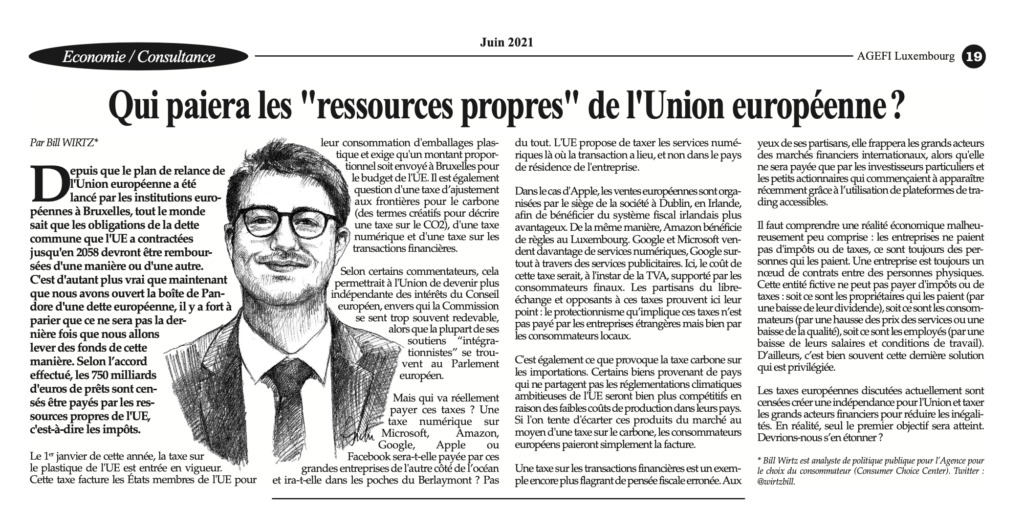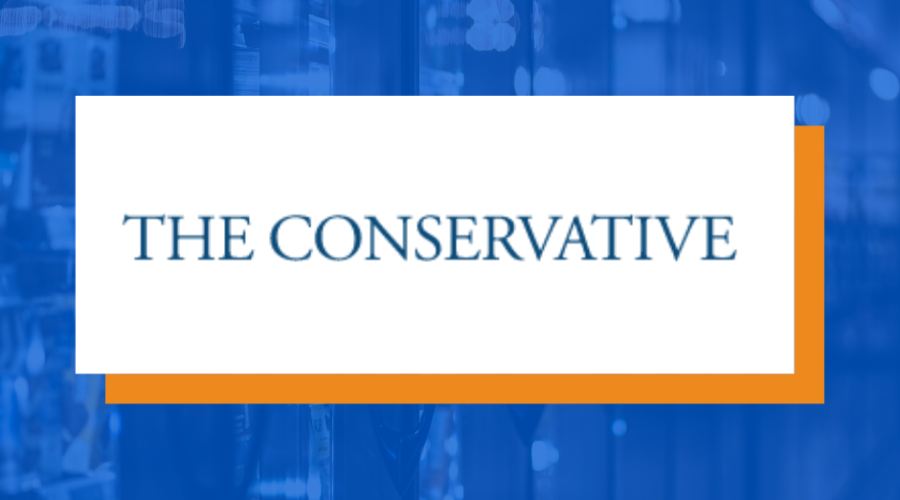Qui paiera les “ressources propres” de l’Union européenne?

Depuis que le plan de relance de l’Union européenne a été lancé par les institutions européennes à Bruxelles, tout le monde sait que les obligations de la dette commune que l’UE a contractée jusqu’en 2058 devront être remboursées d’une manière ou d’une autre. C’est d’autant plus vrai que maintenant que nous avons ouvert la boîte de Pandore d’une dette européenne, il y a fort à parier que ce ne sera pas la dernière fois que nous allons lever des fonds de cette manière. Selon l’accord effectué, les 750 milliards d’euros de prêts sont censés être payés par les ressources propres de l’UE, c’est-à-dire les impôts.
Le 1er janvier de cette année, la taxe sur le plastique de l’UE est entrée en vigueur. Cette taxe facture les États membres de l’UE pour leur consommation d’emballages plastique et exige qu’un montant proportionnel soit envoyé à Bruxelles pour le budget de l’UE. Il est également question d’une taxe d’ajustement aux frontières pour le carbone (des termes créatifs pour décrire une taxe sur le CO2), d’une taxe numérique et d’une taxe sur les transactions financières. Selon certains commentateurs, cela permettrait à l’Union de devenir plus indépendante des intérêts du Conseil européen, auquel la Commission se sent trop souvent redevable, alors que la plupart de ses soutiens “intégrationnistes” se trouvent au Parlement européen.
Mais qui va réellement payer ces taxes ? Une taxe numérique sur Microsoft, Amazon, Google, Apple ou Facebook sera-t-elle payée par ces grandes entreprises de l’autre côté de l’océan et ira-t-elle dans les poches du Berlaymont ? Pas du tout. L’UE propose de taxer les services numériques là où la transaction a lieu, et non dans le pays de résidence de l’entreprise. Dans le cas d’Apple, les ventes européennes sont organisées par le siège de la société à Dublin, en Irlande, afin de bénéficier du système fiscal irlandais plus avantageux. De la même manière, Amazon bénéficie de règles au Luxembourg. Google et Microsoft vendent davantage de services numériques, Google surtout à travers des services publicitaires. Ici, le coût de cette taxe serait, à l’instar de la TVA, supporté par les consommateurs finaux. Les partisans du libre-échange et opposants à ces taxes prouvent ici leur point : le protectionnisme qu’implique ces taxes n’est pas payé par les entreprises étrangères mais bien par les consommateurs locaux.
C’est également ce que provoque la taxe carbone sur les importations. Certains biens provenant de pays qui ne partagent pas les réglementations climatiques ambitieuses de l’UE seront bien plus compétitifs en raison des faibles coûts de production dans leurs pays. Si l’on tente d’écarter ces produits du marché au moyen d’une taxe sur le carbone, les consommateurs européens paieront simplement la facture .
Une taxe sur les transactions financières est un exemple encore plus flagrant de pensée fiscale erronée. Aux yeux de ses partisans, elle frappera les grands acteurs des marchés financiers internationaux, alors qu’elle ne sera payée que par les investisseurs particuliers et les petits actionnaires qui commençaient à apparaître récemment grâce à l’utilisation de plateformes de trading accessibles.
Il faut comprendre une réalité économique malheureusement peu comprise : les entreprises ne paient pas d’impôts ou de taxes, ce sont toujours des personnes qui les paient. Une entreprise est toujours un nœud de contrats entre des personnes physiques. Cette entité fictive ne peut pas payer d’impôts ou de taxes : soit ce sont les propriétaires qui les paient (par une baisse de leur dividende), soit ce sont les consommateurs (par une hausse des prix des services ou une baisse de la qualité) soit ceux sont les employés (par une baisse de leurs salaires et conditions de travail). D’ailleurs, c’est bien souvent cette dernière solution qui est privilégiée.
Les taxes européennes discutées actuellement sont censées créer une indépendance pour l’Union et taxer les grands acteurs financiers pour réduire les inégalités. En réalité, seul le premier objectif sera atteint. Devrions-nous s’en étonner ?





